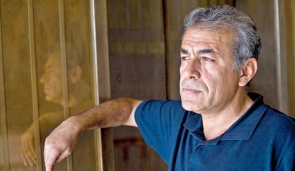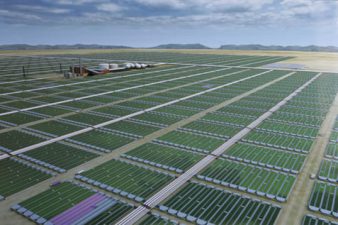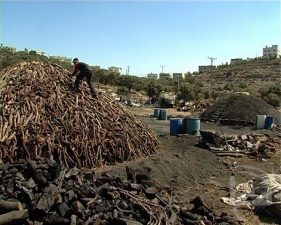 Palestinian Architect Omar Yousef draws attention to the occupation’s “forced ecology” at the Ecoweek conference in Israel [image taken by Tomer Appelbaum]
Palestinian Architect Omar Yousef draws attention to the occupation’s “forced ecology” at the Ecoweek conference in Israel [image taken by Tomer Appelbaum]
Designed to teach young architects the most progressive building practices available, beyond borders or cultural differences, the Ecoweek conference taking place in Israel draws inevitable attention to disparities.
Green Prophet’s interest in natural building practices such as Hassan Fathy’s Nubian-esque structures stems from our intellectual interest in and understanding of ecology. Yousef, on the other hand, explains how in Palestinian territories, natural building occurs out of necessity.
Haphazard Architecture
A Professor at Al Quds Palestinian University in Jerusalem, Omar Yousef is one of several guests slated to influence budding architects to incorporate greener principles into their design.
But his presentation, entitled “Recyling Water in Gaza: Discrepancy between Sustainable Ecology and the Occupation,” has a political spin, according to Haaretz reporter Esther Zandberg.
Yousef grew up in East Jerusalem and lives and works in Shuafat. In his time, he has not witnessed a systematic building pattern, but rather a haphazard pattern that responds to daily happenstance.
“It is an architecture of chaos, crowdedness, instability, temporariness and destruction, improvised building additions and a separation fence,” he told Zandberg, “…an authentic reaction to necessities, a testimony to the survival instinct of Palestinian society.”
Ideology vs necessity
Whereas we tout the benefits of green building techniques and earth-based architecture, advocating a healthy dose of peaceful harmony thrown in the mix, Palestinians can’t afford to be so ideological. According to Yousef,
Ironically, Gaza’s population is also very ecologically aware, involuntarily, and the consumer world could learn from it.For lack of conventional building materials, they build houses out of mud and straw. For lack of waste disposal sites, they use junk to build playgrounds for children and recycle overflowing sewerage for irrigation and watering vegetable plots (permaculture.)
Though the complicated political situation does not escape us, and we are deeply empathetic to all suffering, we provide environmental news and leave politics to the experts. However, what we did find interesting is this notion of what Yousef calls “forced ecology.”
Living and building simply
Without the political spin, the description of houses built of mud and straw sounds like a community using the materials at hand to eke out a life. This is what we did before the Industrial Revolution. This is what we always should do.
Our modern concept of architecture and design, on the other hand, assumes that there are no limits to where we can source our materials, no limits to how big we can build, because the earth’s bounty overflows.
This thinking has given us front row tickets to the uncomfortable, and sometimes frightening, theater of rising temperatures and seas.
Earth architecture is sustainable
“Currently it is estimated that one half of the world’s population—approximately three billion people on six continents—lives or works in buildings constructed of earth,” according to EarthArchitecture.org.
Earth construction is worthwhile. It is sustainable. And I dare to say it only seems unfortunate when compared to the unsustainable high-rises and mansions built by wealthier nations.
Of course, there is no excuse for ruptured infrastructure – such as mismanaged sewage or the lack of waste disposal facilities – that imperils health or happiness, and we hope these issues will be addressed.
But we can all learn a lesson about simpler living from the people who have no other choice.
:: Haaretz
More on Sustainable Building:
Geotectura’s Residential Building Set to Sail
Cambridge to Build Europe’s First Eco-Mosque
Sharing Eco-Friendly Construction Techniques is So’Eco


